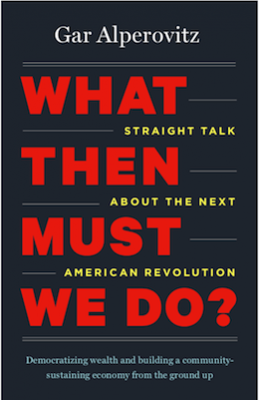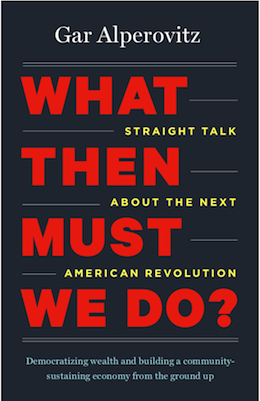The 79-year-old corporate gadfly Robert Monks, the former top federal regulator over America’s pension system, earlier this year opined that Corporate America operates “for the personal enrichment and glorification of its manager-kings.”
Too harsh a judgment? Hardly. Current standard corporate operating procedures only make sense if we acknowledge that American Big Business has essentially become the private preserve of an elite executive class.
How else to explain today’s most routine corporate behaviors? The endless rush to mergers that create little more than workplace chaos. The ongoing refusal to invest significantly in research and development and employee training. The billions of dollars spent to “buy back” company shares of stock.
All these moves leave corporations less equipped to succeed in the long term. But all these moves generate multiple millions, in the here and now, for the corporate executives who make them.

Chelsea Green Publishing
But both these institutions — unions and progressive taxes — have atrophied over recent decades. We’ve slid into what University of Maryland political economist Gar Alperovitz calls a “systemic crisis.” For most Americans, daily life has become an ever-faster treadmill. And no real relief looms on the near horizon.
In this dreary environment, disillusionment with our political leaders rises year by year. So does cynicism. Why bother struggling against an unjust status quo when nothing ever changes?
Alperovitz has a new book out that aims to rouse us from this suffocating political stupor. In What Then Must We Do? Straight Talk about the Next American Revolution, he endeavors to show that societies in “systemic crisis” can change. Revolutions do happen. Indeed, he suggests, “we may now be well into the prehistory of the next American revolution.”
In any social order, Alperovitz explains, political power reflects the ongoing distribution of wealth. Meaningful change only begins when that existing distribution starts coming under challenge.
Alperovitz sees the challenge needed today as much more than any single campaign for a candidate or cause. He has something deeper in mind: an “evolutionary reconstruction” of our society, a decades-long shift that aims to democratize wealth, to build “a community-sustaining economy from the ground up.”
Pie-in-the-sky fantasy? We already, notes Alperovitz, have the seeds of an alternate, wealth-democratizing economy in place. Well over 100 million Americans belong to credit unions and co-ops. Ten million Americans labor in worker-owned enterprises. Millions more live in municipalities where public institutions generate electric power — or even provide Internet service.
Alperovitz envisions a steady expansion of wealth-democratizing institutions like these. Over time, the people these institutions touch begin to see from their daily experiences that alternatives to our dominant corporate status quo do exist. They begin to hold “clear ideas” about what can be done.
In times of acute crisis — say another banking failure — people with these clear ideas about democratizing wealth won’t let their tax dollars bail out billionaires. They’ll demand public banks. They’ll carve away at private corporate power, bit by bit.
What Then Must We Do? mixes these intoxicating visions of a future yet to be with concrete descriptions of wealth-democratizing efforts already underway, from Cleveland and Chattanooga to Portland and Sacramento.
America, Alperovitz reminds us, has become the world’s wealthiest nation. Our annual income, if divided equally, would be enough to bring each family of four $200,000. We can, in other words, do far better for average Americans than we do today. Why not try?
